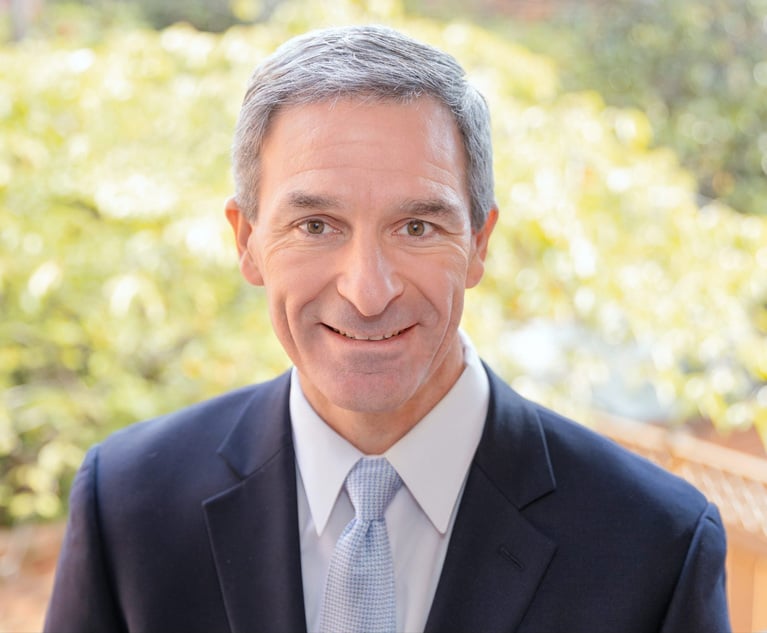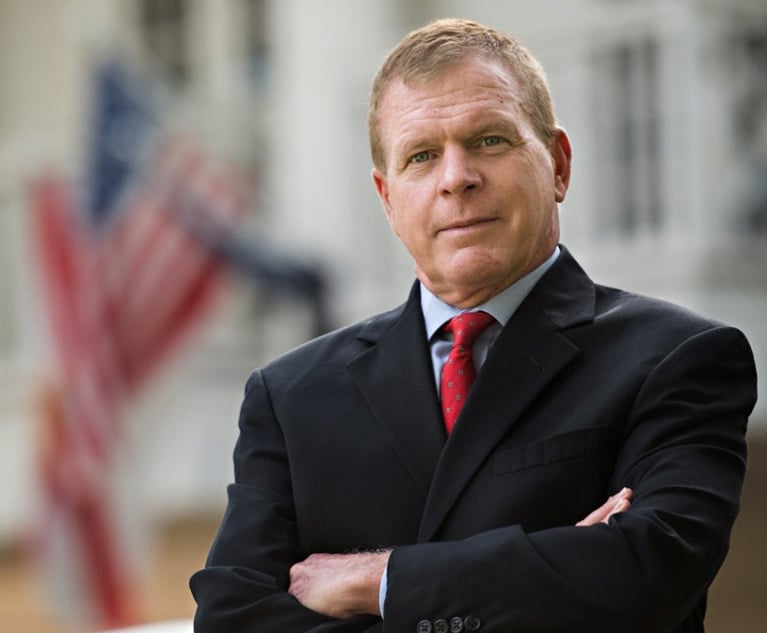How to Make the Kavanaugh Hearings Matter
Democratic senators should focus on areas where Kavanaugh already has spoken publicly and expressed troubling views.
August 27, 2018 at 06:20 PM
5 minute read

When the president and the majority of the Senate are of the same political party, confirmation hearings for the U.S. Supreme Court nominees rarely matter. In January 2006, I testified before the U.S. Senate Judiciary Committee against the confirmation of Samuel Alito. At a break, then-Sen. Joe Biden came up to me and said that it was all an exercise in Kabuki theater. He said that everyone in the room knew that Alito was going to be a very conservative justice. He said that the Republicans were pretending that he was open-minded and had no ideology, while the Democrats were trying to ask questions to trip him up and he was too smart for that.
I fear that the confirmation hearings for Brett Kavanaugh are likely to replicate this. But what should be the strategy for Democratic senators in asking questions to try and make the hearings matter?
To begin with, they should not waste their time asking Kavanaugh questions about his views on precedent and stare decisis. Kavanaugh, of course, will extol the importance of following precedent, but rightly acknowledge that there are times when prior decisions need to be overruled. No one can disagree with this view, but it tells the senators nothing useful and Kavanaugh is not going to indicate which precedents he'd vote to overrule.
Nor is lengthy focus on Kavanaugh's philosophy of constitutional interpretation and statutory interpretation likely to be useful. Kavanaugh, like Neil Gorsuch a year ago, will present himself as an originalist in constitutional cases and as a believer in following the plain meaning of statutes. By itself, this is not going to cause undecided senators to vote against him and Kavanaugh surely will not go further as to how his interpretive philosophy will cause him to resolve specific matters.
By contrast, I think that Democratic senators should focus on areas where Kavanaugh already has spoken publicly and expressed troubling views. In these areas, where he already has taken positions in speeches and articles, it is hard to justify his refusing to answer questions. Most notably, in the area of executive power, Kavanaugh several times has expressed a view of great deference to the president.
For example, when asked by an audience member about what precedent he would like to see overruled, Kavanaugh said Morrison v. Olson, a 1988 decision which, 7-1, upheld the constitutionality of the appointment of an independent counsel under the Ethics in Government Act. He also has criticized the court's decision in United States v. Nixon, a unanimous 1974 decision which held that Richard Nixon was required to comply with a subpoena and produce the White House tapes. In a law review article, Kavanaugh expressed the view that a sitting president should be immune from civil or criminal investigations.
These are extreme views about topics of great importance given the current president. At a time when checks and balances are more important than ever, Kavanaugh should be pressed by senators to explain these views. If indeed these are his positions, my hope is that they might be enough to persuade senators to vote against him.
Questions also should focus on the areas where Kavanaugh replacing Justice Anthony Kennedy is likely to make a huge difference in the law. Five areas immediately come to mind: (1) abortion rights: Kennedy was the fifth vote to reaffirm Roe v. Wade in 1992 and to strike down a Texas law that would have closed most abortion clinics in the state in 2016; (2) affirmative action: Kennedy wrote the majority opinion upholding the University of Texas affirmative action plan in 2016; (3) gay and lesbian rights: Kennedy authored the majority opinion in every Supreme Court decision expanding rights for gays and lesbians; (4) punishment in criminal cases: Kennedy wrote the majority opinion in 5-4 decisions preventing the death penalty from being used for crimes committed by juveniles or in cases of child rape; and (5) disparate impact liability: Kennedy wrote the majority opinion allowing liability based on disparate impact under the Fair Housing Act.
Of course, no one suggests asking Kavanaugh how he will vote in the future. But it is completely appropriate to ask Kavanaugh how he would have voted had he been on the court when Roe was decided or when Fisher v. University of Texas, Austin, which upheld university affirmative action programs, was decided, or when the court handed down other major rulings.
If Kavanaugh refuses to answer, or his answers are not credible, it is completely appropriate for the Senate to deny him confirmation. President Donald Trump has made clear that he picked Kavanaugh for his conservative views. It is equally appropriate for the Senate to deny confirmation because of those views or because of Kavanaugh's refusal to answer questions.
There is no basis in the Constitution or law for the idea that nominees for the Supreme Court should be given a free pass on explaining their views. A justice is not deemed biased just because we know his or her views on matters likely to come before the court. We all know how Ruth Bader Ginsburg and Clarence Thomas will vote when the issue comes before them as to whether Roe should be overruled. But no one suggests that disqualifies them.
Ultimately, whether the confirmation hearings are meaningful or an exercise in Kabuki theater depends on the senators and whether they are willing to vote against confirmation if Kavanaugh won't answer their questions.
Erwin Chemerinsky is dean and a Jesse H. Choper distinguished professor of law at the University of California, Berkeley School of Law.
This content has been archived. It is available through our partners, LexisNexis® and Bloomberg Law.
To view this content, please continue to their sites.
Not a Lexis Subscriber?
Subscribe Now
Not a Bloomberg Law Subscriber?
Subscribe Now
NOT FOR REPRINT
© 2025 ALM Global, LLC, All Rights Reserved. Request academic re-use from www.copyright.com. All other uses, submit a request to [email protected]. For more information visit Asset & Logo Licensing.
You Might Like
View All


Restoring Antitrust: Returning to the Consumer Welfare Standard
Trending Stories
- 1ACC CLO Survey Waves Warning Flags for Boards
- 2States Accuse Trump of Thwarting Court's Funding Restoration Order
- 3Microsoft Becomes Latest Tech Company to Face Claims of Stealing Marketing Commissions From Influencers
- 4Coral Gables Attorney Busted for Stalking Lawyer
- 5Trump's DOJ Delays Releasing Jan. 6 FBI Agents List Under Consent Order
Who Got The Work
J. Brugh Lower of Gibbons has entered an appearance for industrial equipment supplier Devco Corporation in a pending trademark infringement lawsuit. The suit, accusing the defendant of selling knock-off Graco products, was filed Dec. 18 in New Jersey District Court by Rivkin Radler on behalf of Graco Inc. and Graco Minnesota. The case, assigned to U.S. District Judge Zahid N. Quraishi, is 3:24-cv-11294, Graco Inc. et al v. Devco Corporation.
Who Got The Work
Rebecca Maller-Stein and Kent A. Yalowitz of Arnold & Porter Kaye Scholer have entered their appearances for Hanaco Venture Capital and its executives, Lior Prosor and David Frankel, in a pending securities lawsuit. The action, filed on Dec. 24 in New York Southern District Court by Zell, Aron & Co. on behalf of Goldeneye Advisors, accuses the defendants of negligently and fraudulently managing the plaintiff's $1 million investment. The case, assigned to U.S. District Judge Vernon S. Broderick, is 1:24-cv-09918, Goldeneye Advisors, LLC v. Hanaco Venture Capital, Ltd. et al.
Who Got The Work
Attorneys from A&O Shearman has stepped in as defense counsel for Toronto-Dominion Bank and other defendants in a pending securities class action. The suit, filed Dec. 11 in New York Southern District Court by Bleichmar Fonti & Auld, accuses the defendants of concealing the bank's 'pervasive' deficiencies in regards to its compliance with the Bank Secrecy Act and the quality of its anti-money laundering controls. The case, assigned to U.S. District Judge Arun Subramanian, is 1:24-cv-09445, Gonzalez v. The Toronto-Dominion Bank et al.
Who Got The Work
Crown Castle International, a Pennsylvania company providing shared communications infrastructure, has turned to Luke D. Wolf of Gordon Rees Scully Mansukhani to fend off a pending breach-of-contract lawsuit. The court action, filed Nov. 25 in Michigan Eastern District Court by Hooper Hathaway PC on behalf of The Town Residences LLC, accuses Crown Castle of failing to transfer approximately $30,000 in utility payments from T-Mobile in breach of a roof-top lease and assignment agreement. The case, assigned to U.S. District Judge Susan K. Declercq, is 2:24-cv-13131, The Town Residences LLC v. T-Mobile US, Inc. et al.
Who Got The Work
Wilfred P. Coronato and Daniel M. Schwartz of McCarter & English have stepped in as defense counsel to Electrolux Home Products Inc. in a pending product liability lawsuit. The court action, filed Nov. 26 in New York Eastern District Court by Poulos Lopiccolo PC and Nagel Rice LLP on behalf of David Stern, alleges that the defendant's refrigerators’ drawers and shelving repeatedly break and fall apart within months after purchase. The case, assigned to U.S. District Judge Joan M. Azrack, is 2:24-cv-08204, Stern v. Electrolux Home Products, Inc.
Featured Firms
Law Offices of Gary Martin Hays & Associates, P.C.
(470) 294-1674
Law Offices of Mark E. Salomone
(857) 444-6468
Smith & Hassler
(713) 739-1250









